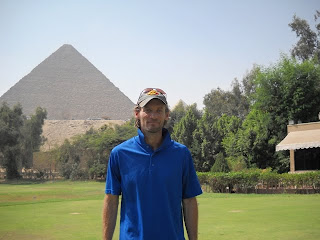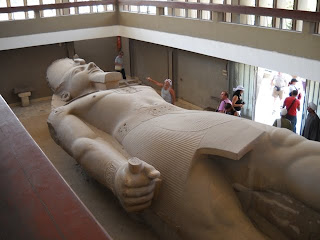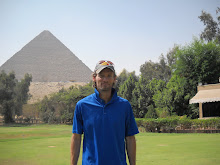I’m sitting in my apartment just after embarrassing moment #2 in Egypt. I’ve had two rather embarrassing moments since I’ve moved to Egypt. In reverse chronological order, they are:
Embarrassing moment #2. Locked out of my apartment.
The campus is about 20 miles away, and driving in Cairo is not for the faint hearted westerner. So I ride a bus to campus and back. As I’m on the bus home today, I realize that I left the keys to my apartment in the office. I made a few phone calls, but no one answered, so my choice is to (a) take a bus back to campus at 7PM (a 1-hour ride) to get the keys and then bus home again at 9PM (another 1-hour ride) or (b) see if I can get the apartment folks to let me in. I decide for option (b), get off the bus and walk to my apartment. Fortunately, the cleaning guy is outside, and he speaks 10% English. So I manage to communicate to him what my problem is. He makes a phone call, and after some frantic words in Arabic, he tells me to wait 10 minutes and someone will come to help me. I ask him how much this will cost me and he says 20 pounds (that is about $4). So I say OK.
About 20 minutes later someone shows up. I expected the apartment manager with a spare set of keys, what I got what a carpenter with a hammer and a wedge. He follows me up to my 3rd floor apartment and tries to open the door by driving the wedge in the space between the door and the lock, like you might open a door with a credit card in the US. Now, I have no idea how to say “Sorry, I locked the deadbolt this morning” in Arabic, so I just have to wait until he can figure that out for himself. He does. He says to me in English “5 minutes” and then goes downstairs and comes back in 10 minutes with more hammers. Again, I expected some type of locksmith operation, but his approach now is to hammer away until he knocks the entire lock out of the door. So I’m looking at my apartment door with a big hole in it where the lock used to be, and he then fiddles with a screwdriver until he gets the door open.
At this point, I’m glad to be inside, but I’m wondering how much the university housing office is going to dock my pay for ruining a door and a lock. However, Ahmed

produces a spare lock and key that he puts into my door and everything is good as new. Well, almost—a lot of scratches and chipped paint, but hey! I’m inside.
So now, Mohammed (the cleaning man) comes back up, and tells me in English that the price for a new lock is 50 pounds (about $9). So I pay the 50 pounds to Ahmed. Then, thinking I’m being a bit savvy, I ask what Ahmed’s taxi ride to get here cost him. Mohammed says 50 pounds, but Ahmed quickly corrects him, and after some words in Arabic between them, Mohammed tells me in English that Ahmed needs 70 pounds for his taxi (I expect it really cost about 20). So of course, I may as well be wearing a shirt that says in Arabic “I’m new, I’m an American, I’m an ATM”—but I give Ahmed the 70 pounds (about $14). Then just for good measure, I give Ahmed and Mohammed each a 10 pound tip (so that’s another $2 each) because who knows when I may lock myself out again.
Well, I’m inside, at least. And now I know to leave a spare key in my computer bag. I’m reminded of stanza from Don Henley:
Well we barely made the airport for the last plane out
As we taxied down the runway, I could hear the people shout
They said don’t come back here Yankee --
But if I ever do
I’ll bring more money
Embarrassing moment #1. Wrong bus stop.
So, as I said, I bus to campus and back. The first day I did this it was easy. I got on the bus at Victoria Square, just down from my apartment, the bus drove to campus, and then the bus in the afternoon brought me right back to Victoria square. Piece of cake.
So I get on the bus the next day and ride home. I figured when it stopped I’d get off right by my apartment. This ride, however, suddenly has frequent stops. It is my 3rd day here, so nothing looks familiar to me. Finally, we get to the last stop, everyone gets off, and I have no %!@#@!% idea where I am. I step off this bus, look around, and then (somewhat pitifully) say to the driver “eye-na?” which is what I learned as “Where is?” in Arabic (but it turns out they don’t use that phrase in Cairo), and I try to communicate to him that I’m lost. He looks at me, and I say “Victoria Square?” and after some gesturing he gets the point and says “I take you.”
So I get back on the bus, sit down, and the driver starts the bus up. Then the bus supervisor gets back on the bus. Now, I don’t understand Arabic yet, but I can tell what he says to the driver: “What the hell are you doing?” in Arabic. After a brief flurry in Arabic between them, the bus supervisor turns to me and says, “You need to go to Victoria Square?” and I say “Yes.” He says, “but we already passed Victoria Square” and would have added “you nitwit” if he knew how to say that in English. So I tell him, “I’m new, it’s my second day, I just missed it, I’m lost.” He then says to me “OK. But you can take that taxi right there; don’t pay him any more than 3 pounds.” I say, OK, but all I have with me are 100 pound notes (taxis in Maadi will NOT make change).

Well, I guess the only thing more galling to the bus supervisor than driving me back to Victoria Square was for a Maadi taxi to make a 97 pound tip for taking me back to Victoria Square, because then he starts giving me directions on how to walk there. A left, then a right, then straight, then 2 lefts, then a u-turn past the camel,…geez. My eyes start to glaze over, but I decide that if I head out and wander through Maadi long enough I’ll surely recognize something.
Then the driver (who I think had some sympathy for me) starts in frantically in Arabic. They go back and forth for a minute or so, after which the bus supervisor turns to me and says, “OK, we will take you to Victoria Square.” I say “Show Kran, Show Kran” (thank-you, thank-you). A 5 minute bus ride later and we are there. I apologize again, say thanks, and get off the bus.
For the next 5 days that I ride the bus, the bus supervisor comes up to me every day and says, “The next stop is Victoria Square.” I’ve got it now!
 Some random pictures of the pyramids by the course:
Some random pictures of the pyramids by the course: In addition to being adjacent to the Giza pyramids, the golf course has at least 3 mosques right around it. This isn't unusual, there are mosques everywhere in Cairo and I have been awakened by the morning call to prayer from the mosque in my neighborhood. Since we played on Friday, the "church" day for Muslims, we were on the course when the mosques started broadcasting the call to prayer. So it was a true Egypt experience, listening to the prayers with the Giza pyramid in the background. Of course, I felt a bit the crass colonialist playing golf at the same time, but I enjoyed the experience. Here is a brief video I took at this time:
In addition to being adjacent to the Giza pyramids, the golf course has at least 3 mosques right around it. This isn't unusual, there are mosques everywhere in Cairo and I have been awakened by the morning call to prayer from the mosque in my neighborhood. Since we played on Friday, the "church" day for Muslims, we were on the course when the mosques started broadcasting the call to prayer. So it was a true Egypt experience, listening to the prayers with the Giza pyramid in the background. Of course, I felt a bit the crass colonialist playing golf at the same time, but I enjoyed the experience. Here is a brief video I took at this time:
























